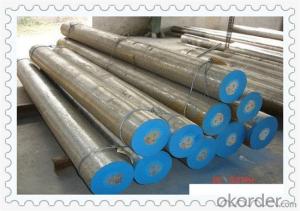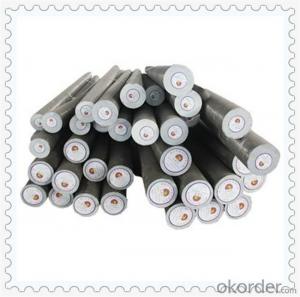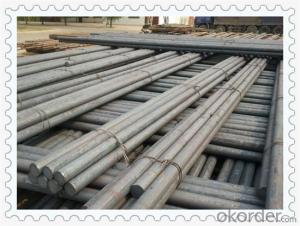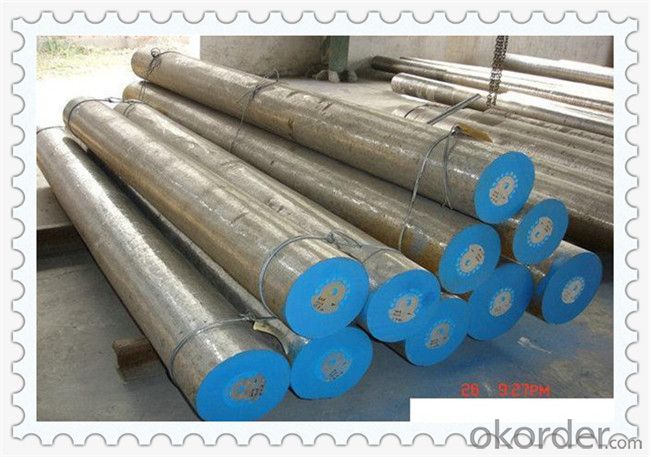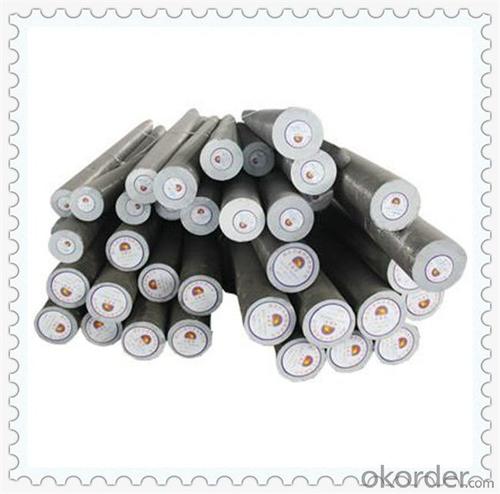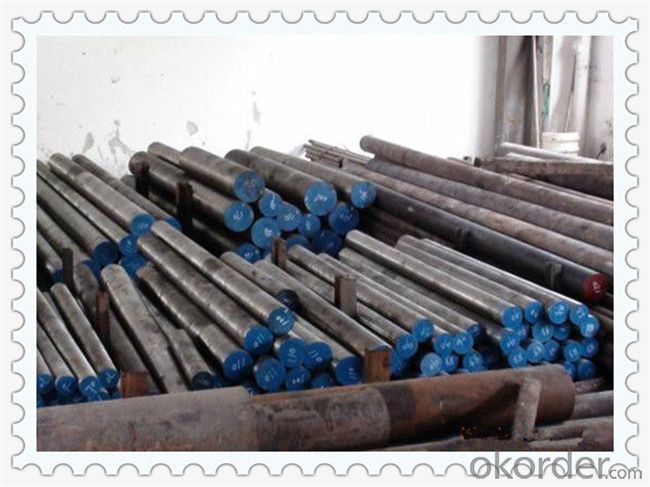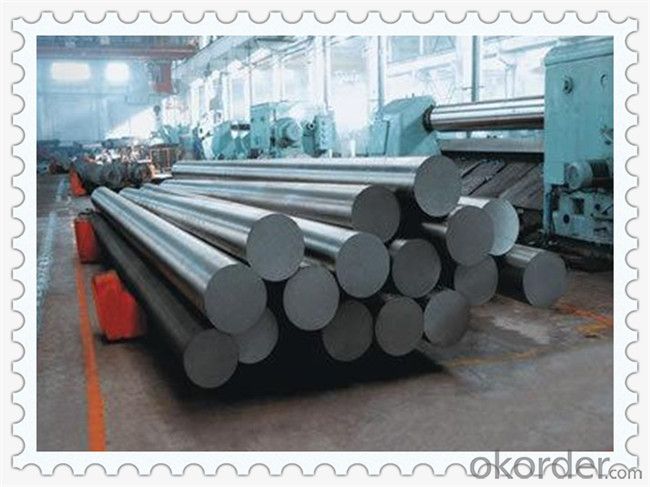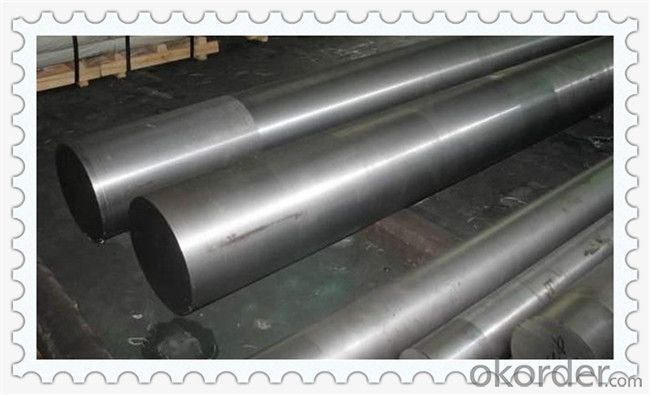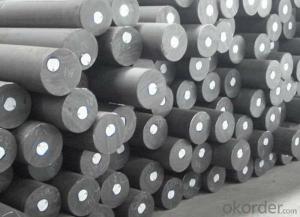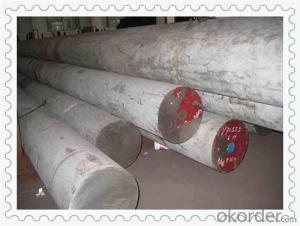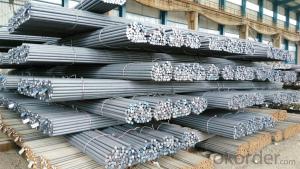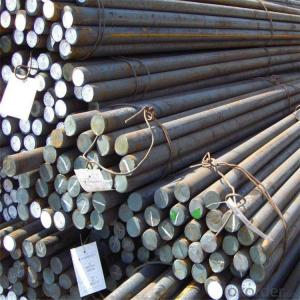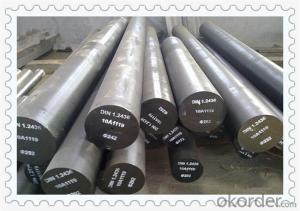AISI 1060 Carbon Steel Round Bars C60
- Loading Port:
- China main port
- Payment Terms:
- TT OR LC
- Min Order Qty:
- 30 m.t.
- Supply Capability:
- 10000 m.t./month
OKorder Service Pledge
OKorder Financial Service
You Might Also Like
AISI 1060 Carbon Steel Round Bars C60
Products Details
Chemical Compostion
Grade | C | Si | Mn | P | S | Cr | Ni |
1055 | 0.50-0.60 | 0.10-0.25 | 0.60-0.90 | Max 0.035 | Max 0.035 | 0.30-0.40 | Max 0.30 |
1060 | 0.57-0.65 | 0.17-0.37 | 0.50-0.80 | Max 0.035 | Max 0.035 | 0.30-0.40 | Max 0.30 |
Mechanical Properties
Grade | Tensile Strength (MPa) | Yield Strength (MPa) | Elongation (%) | Hardness (Annealing) |
1055 | 645 | 380 | 13 | 255 |
1066 | 675 | 400 | 12 | 255 |
Dimentional Range
Hot-rolled | Cold-drawn | Forged | |
Round | 20mm-300mm | 16mm-70mm | 250mm-800mm |
Square | 20*20mm - 130*130mm | 10*10mm-80*80mm | Your requirements |
Flat | Thickness:12mm-100mm Width: 20mm-150mm | Thickness:6mm-70mm Width:16mm-80mm | Your requirements |
Size Tolerances
# Hot-rolled steel round or square bar
d/a(mm) | 5.5-7 | 7-20 | 20-30 | 30-50 | 50-80 | 80-110 | 110-150 | 150-190 | 190-250 |
(mm) | +0.30 -0.30 | +0.35 -0.35 | +0.40 -0.40 | +0.50 -0.50 | +0.70 -0.70 | +1.0 -1.0 | +1.3 -1.3 | +2.0 -2.0 | +2.5 -2.5 |
# Hot-rolled flat bar
Width(mm) | Thickness(mm) | ||||
Size | Size tolerance | Size | Size tolerance | ||
Normal | Better | Normal | Better | ||
10-50 | +0.5, -1.0 | +0.3, -0.9 | 3-16 | +0.3, -0.5 | +0.2, -0.4 |
50-75 | +0.6, -1.3 | +0.4, -1.2 | 16-60 | +1.5% -3.0% | +1.0% -2.5% |
75-100 | +0.9, -1.8 | +0.7, -1.7 | |||
100-150 | +1.0%, -2.0% | +0.8%, -1.8% | |||
Products Show
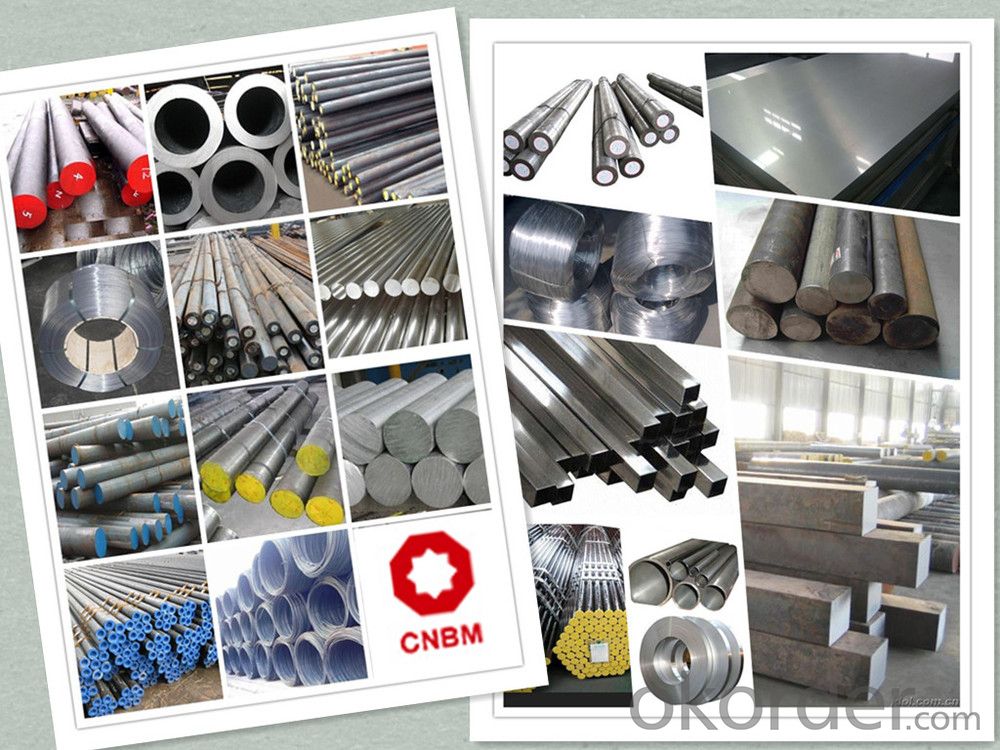
Product Overviews
| Product Name | Typical Grades | Diameter(mm) | Standard adopted |
| Carbon Steel | 20 (1020/S20C/C22) | Ø16-Ø300 |
GB/SAE/JIS/DIN
|
| 40 (1040/S40C/C40) | |||
| 45 (1045/S45C/C45) | |||
| Bearing Steel | GCr9 (51100/SUJ1) | Ø12-Ø250 | |
| GCr15 (52100/SUJ2/100Gr6) | |||
| GCr9SiMn (A485-Gr.1/SUJ3) | |||
Cr-Mo Steel | 20Cr (5120/SCr420H/20Cr4) | Ø12-Ø250 | |
| 40Cr (5140/SCr440/41Cr4) | |||
| 42CrMo(4140/SCM440/42CrMo4) | |||
| Gear Steel | 20CrNiMo | Ø16-Ø600 | |
| 20CrMn(5115/SMnC420/20MnCr5) | |||
| 20CrNiMo(8620/SNCM220/20CrMiMo2) |
Application
| Carbon Steel | Mold bottom, Plastic mold, Construction machinery parts Automobile parts, Security grills, Screens, Construction |
| Bearing Steel | Aerospace, Navigation, Nuclear energy, Chemical industry Electronic information, Petrochemical, Instrument and meter Transportation |
| Cr-Mo Steel | Mechanism & Fasteners gear, Stressed components for vehicles Engines and machines, Parts of larger cross-section |
| Gear Steel | All kinds of gears, Statically and dynamically stressed component for vehicles Engines and machine, Larger cross-section parts, Crankshafts |
Work Shop
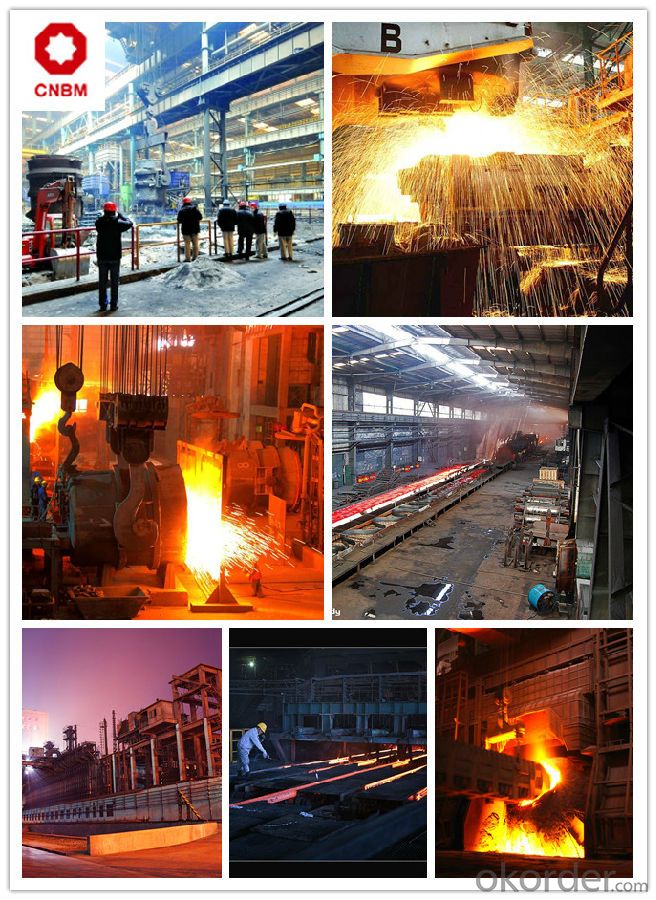
Company Information
CNBM International Corporation is the most important trading platform of CNBM group.
Whith its advantages, CNBM International are mainly concentrate on Cement, Glass, Iron and Steel, Ceramics industries and devotes herself for supplying high qulity series of refractories as well as technical consultancies and logistics solutions.

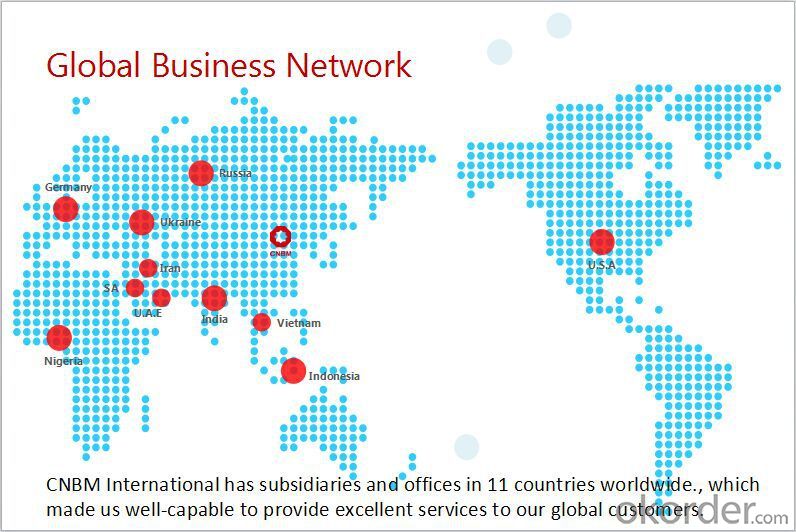
FAQ
1, Your advantages?
professional products inquiry, products knowledge train (for agents), smooth goods delivery, excellent customer solution proposale
2, Test & Certificate?
SGS test is available, customer inspection before shipping is welcome, third party inspection is no problem
3, Factory or Trading Company?
CNBM is a trading company but we have so many protocol factories and CNBM works as a trading department of these factories. Also CNBM is the holding company of many factories.
4, Payment Terms?
30% TT as deposit and 70% before delivery.
Irrevocable L/C at sight.
5, Trading Terms?
EXW, FOB, CIF, FFR, CNF
6, After-sale Service?
CNBM provides the services and support you need for every step of our cooperation. We're the business partner you can trust.
For any problem, please kindly contact us at any your convenient time.
We'll reply you in our first priority within 24 hours.
Packaging & Delivery
1, Packaging: seaworthy package or as required
2, Delivery: 35-45 days or based on quantity
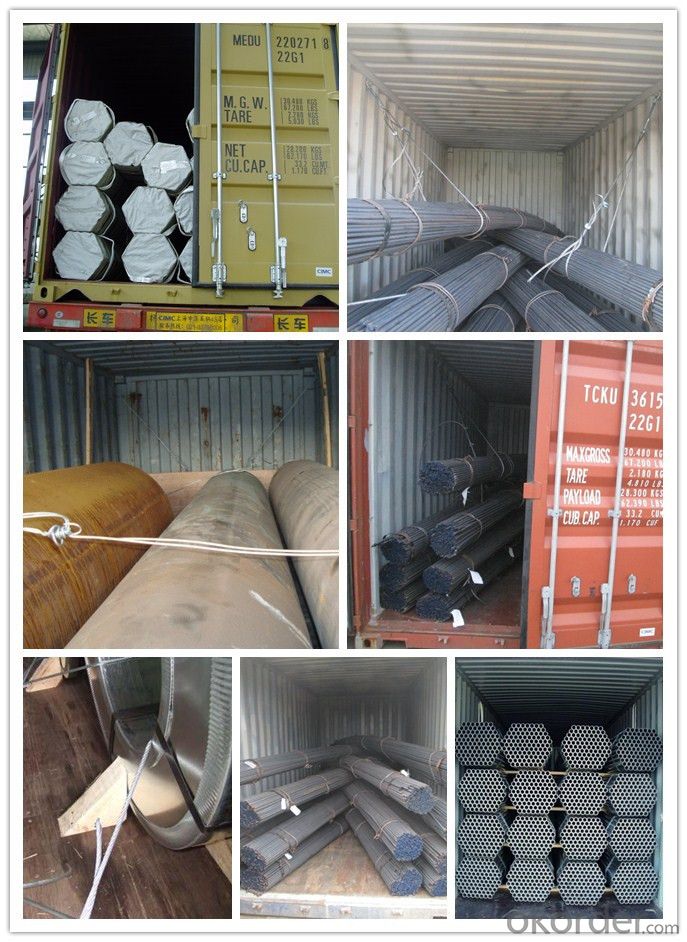
- Q: How do steel round bars compare to ceramic round bars?
- The properties and applications of steel round bars and ceramic round bars differ significantly. Steel round bars exhibit exceptional strength and durability due to their composition of iron and carbon alloys, along with additional elements like manganese, chromium, and nickel. They possess high resistance to deformation, can withstand high temperatures, and have impressive tensile strength. As a result, steel round bars find common use in construction, manufacturing, and engineering industries where strength and reliability are vital. Their versatility allows for easy machining and shaping into various forms. On the contrary, ceramic round bars consist of non-metallic materials such as clay, porcelain, or glass. Ceramics offer distinct properties, including heat resistance, corrosion resistance, and wear resistance. Additionally, they are chemically inert and exhibit excellent electrical insulation capabilities. Ceramic round bars are frequently employed in industries that demand high-temperature resistance, chemical resistance, or electrical insulation, such as aerospace or electronic component manufacturing. When comparing steel round bars to ceramic round bars, it is crucial to consider the specific requirements of the application at hand. Steel round bars are preferred for heavy-duty uses where mechanical stress and load-bearing capabilities are essential, owing to their exceptional strength and toughness. Conversely, ceramic round bars are often chosen for their resistance to heat, chemicals, and electrical insulation properties, which play a crucial role in specialized industries. In conclusion, steel round bars and ceramic round bars possess distinct properties and are suitable for diverse applications. Steel round bars excel in heavy-duty uses, owing to their strength and durability, while ceramic round bars are particularly valuable in applications requiring high-temperature resistance, chemical resistance, and electrical insulation.
- Q: Difference between cold drawn round steel and round steel
- Cold formed steel allows partial buckling of the cross section, thus taking full advantage of the post buckling capacity of the member, while the hot-rolled section does not allow partial buckling of the cross section.
- Q: What are the typical hardness values for different grades of steel round bars?
- The hardness values for different grades of steel round bars can vary depending on the specific grade and the manufacturing process used. However, there are some typical hardness values that can be used as a general guideline. For low carbon or mild steel round bars, the typical hardness values range from about 120 to 250 Brinell Hardness (HB). These grades of steel are known for their relatively low strength and hardness but can be easily machined and welded. Medium carbon steel round bars, commonly used in applications that require higher strength and hardness, typically have hardness values ranging from about 200 to 400 HB. These grades of steel are often used in construction, automotive, and machinery industries. High carbon or alloy steel round bars, which offer even greater strength and hardness, can have hardness values ranging from 400 to 700 HB or even higher. These grades of steel are commonly used in applications that require high wear resistance, such as cutting tools, gears, and bearings. It is important to note that these hardness values are approximate and can vary depending on factors such as heat treatment, alloy composition, and the specific manufacturing process employed. Therefore, it is always recommended to consult the manufacturer's specifications or conduct hardness testing to determine the exact hardness values for a specific grade of steel round bar.
- Q: Are steel round bars prone to fatigue failure?
- Fatigue failure is a common occurrence in steel round bars, which can be attributed to repeated cyclic loading or stress. This leads to a gradual weakening of the material, eventually causing it to fail, even if the applied stress is below its ultimate strength. Due to their inherent characteristics, steel round bars, like other structural materials, are susceptible to fatigue failure. Various factors can contribute to fatigue failure in steel round bars, including improper design, inadequate material selection, manufacturing defects, and excessive cyclic loading. Additionally, surface defects, notches, stress concentrations, and corrosive environments can further accelerate the fatigue process. Engineers and designers take several measures to mitigate the risk of fatigue failure. These include implementing appropriate design practices, selecting high-quality materials, conducting thorough inspections, applying stress-relieving treatments, and considering the impact of cyclic loading during the structural design phase. It is important to understand that the susceptibility of steel round bars to fatigue failure depends on multiple factors, such as the specific steel grade, loading conditions, environmental factors, and overall structural design. Therefore, it is crucial to carefully assess these factors and employ appropriate mitigation measures to ensure the safe and reliable performance of steel round bars in various applications.
- Q: Are steel round bars suitable for bridge construction applications?
- Yes, steel round bars are commonly used in bridge construction applications. Steel round bars offer several advantages for bridge construction, including high strength, durability, and versatility. They can withstand heavy loads and provide the necessary structural support required for bridges. Additionally, steel round bars can be easily fabricated and welded, allowing for efficient construction processes. The use of steel round bars in bridge construction also ensures that the bridges are resistant to corrosion, which is particularly important in environments exposed to moisture or harsh weather conditions. Overall, steel round bars are a suitable and commonly used material in bridge construction applications due to their strength, durability, versatility, and resistance to corrosion.
- Q: Can steel round bars be coated with protective coatings?
- Indeed, it is possible to apply protective coatings to steel round bars. These coatings function as a shield, safeguarding the steel against corrosion, abrasion, and other forms of harm. The most prevalent form of protective coating for steel round bars is known as a corrosion-resistant coating. It is typically administered using methods such as hot-dip galvanization, electroplating, or powder coating. These coatings establish a protective layer that prevents the steel from encountering corrosive substances, moisture, and other environmental elements that may lead to deterioration. Furthermore, these coatings have the potential to enhance the aesthetic appeal of the steel round bars and extend their lifespan.
- Q: What is the maximum vanadium content allowed for steel round bars?
- The maximum vanadium content allowed for steel round bars varies depending on the specific steel grade and industry standards. Vanadium is commonly used as an alloying element in steel to improve its strength, hardness, and resistance to corrosion. In general, the maximum vanadium content in steel round bars ranges from 0.02% to 0.25%. However, it is important to note that different steel grades and applications may have specific limits set by industry regulations or customer requirements. Therefore, it is crucial to consult the relevant standards and specifications for the specific steel grade and application to determine the maximum allowed vanadium content for steel round bars.
- Q: Are steel round bars suitable for automotive applications?
- Yes, steel round bars are commonly used in automotive applications due to their high strength, durability, and versatility. They are often used to manufacture components such as axles, crankshafts, and suspension systems, as they provide the necessary strength and support required for these critical automotive parts.
- Q: What are the different types of steel round bar coatings used in the automotive industry?
- There are several different types of steel round bar coatings used in the automotive industry, including galvanized coatings, epoxy coatings, and powder coatings. These coatings are applied to the steel bars to provide protection against corrosion, enhance durability, and improve the overall appearance of the automotive components.
- Q: Can steel round bars be used for making fencing?
- Yes, steel round bars can be used for making fencing. Steel round bars are commonly used in the construction industry for various applications, including fencing. The high strength and durability of steel make it a suitable material for fencing, as it provides a sturdy and long-lasting barrier. Steel round bars can be easily welded or bolted together to create different fencing designs and configurations. Additionally, steel can be galvanized or coated to enhance its resistance to corrosion, making it suitable for outdoor fencing applications. Overall, steel round bars are a versatile and reliable choice for making fencing structures.
Send your message to us
AISI 1060 Carbon Steel Round Bars C60
- Loading Port:
- China main port
- Payment Terms:
- TT OR LC
- Min Order Qty:
- 30 m.t.
- Supply Capability:
- 10000 m.t./month
OKorder Service Pledge
OKorder Financial Service
Similar products
Hot products
Hot Searches
Related keywords
